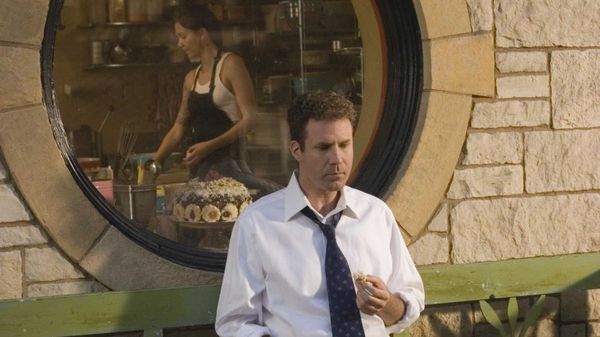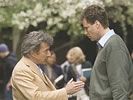Eye For Film >> Movies >> Stranger Than Fiction (2006) Film Review
Stranger Than Fiction
Reviewed by: Angus Wolfe Murray

Taking liberties with imagination is irresistible, but you have to be consistent - Lewis Carroll remains true to Alice throughout Wonderland - and have the courage of your convictions. Stranger Than Fiction loses its bottle in the end and keeps changing the rules as it goes along. Only the performances stay the better side of interesting.
Harold (Will Ferrell) is the very essence of cliche, a taxman who lives alone, can compute complicated mathematical sums in his head, has no friends/hobbies/pets/parents/ambitions/sex appeal. He is Bland-Man, the less-than-super-hero, enslaved by daily routine, such as the exact number of brushes he gives his teeth every morning. As the lead character in a work of fiction, he does not cut the mustard. Who would read past the first chapter?

Here lies the first flaw in the film's conceit. Harold is the creation of Kay Eiffel (Emma Thompson), famous novelist who has been suffering writer's block for 10 years and is embarking on her comeback tome, the story of Harold, who has no life outside his work. Would not a publisher's editor take her to lunch and tactfully, after the second glass of chilled Chardonnay, suggest a more inspiring protagonist? Eiffel, however, is blocked again. As well as being popular with readers, she is famous for bumping off her heroes/heroines and, right now, for some inexplicable reason, can't find a way of doing Harold in. Why can't he die of boredom?
At this point, the film changes direction and drifts tentatively into Charlie Kaufman territory. Harold starts hearing Eiffel's voice-over, describing his actions and what she wants to do with him - i.e. kill him. Suddenly he takes on a life of his own, in order to halt this execution, although you wonder where he finds the energy. He sees a psychiatrist (Linda Hunt), who can barely suppress her giggles and puts him in touch with Prof Hilbert (Dustin Hoffman), an Eng Lit guru of sorts, who might be able to detect the author of his "voice." Also, he becomes emotionally and (gasp!) sexually involved with one of his clients, a feisty, tattooed baker (Maggie Gyllenhaal).
When does Harold stop being Eiffel's Harold and become his own? What can an attractive cookie maker see in a taxman, whose social skills hardly extend beyond multiplication tables? If this unlikely romance belongs to the real Harold, rather than the fictional, what can Eiffel's novel be about? When the Prof reads the manuscript and declares it "a masterpiece," has he lost his reason? What is Queen Latifah doing playing Eiffel's assistant/PA/nursemaid? Her role is irrelevant. When Harold meets his creator, is this taking magic beyond realism into the realms of literary anarchy?
When Ferrell plays deadpan, he resembles a Polynesian statue and when Gyllenhaal plays nice, she sprinkles grated lemons over the icing. Hoffman, in his new capacity as supporting actor, is so relaxed and easy squeezy, you would be forgiven for thinking he was freewheeling. In fact, his Prof Hilbert is a beautifully judged performance, the best from him for ages. As for Thompson, she steals the picture, personifying the self-absorbed eccentricity of someone who can't see beyond a mist of paranoia that obliterates everything except the absolute conviction of her own stressed inadequacies.
Reviewed on: 02 Dec 2006




















